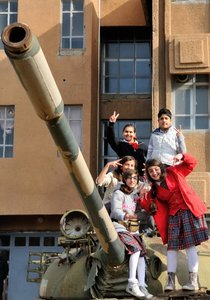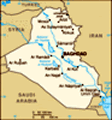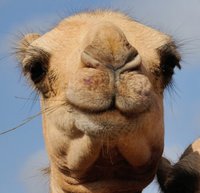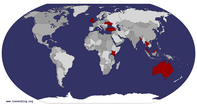COMING SOON HOUSE ADVERTISING ads_leader

 New Iraq, Old Iraq - Amna Suraka, Sulamaniyah, Kurdish Region of Iraq
New Iraq, Old Iraq - Amna Suraka, Sulamaniyah, Kurdish Region of Iraq
Children play on disused tanks formerly under the control of Saddam Hussein.“If you go to Kirkuk, you will be shot,” came the glum assessment from any Kurdish man who spoke about the infamous city a mere one hundred kilometres south of Erbil. If English was not spoken, then the responder would instead clench their hand in the shape of a gun and pretended to fire imaginary rounds into my chest. The message could not be clearer.
Not that I ever intended to visit Kirkuk, but my journey to the cultural centre of the Kurdish Region of Iraq, Sulamaniyah, had two routes. The shorter and more direct path skirts the edge of Kirkuk, a journey dissuaded by all nowadays, whereas the longer and more scenic mountain route was unanimously favoured.
To avoid being within shooting range from Kirkuk, I travelled to Koya by bus, prior to changing to a share taxi for the remaining journey to Sulamaniyah. Leaving Erbil, I sat next to a young man who took great pleasure in practicing English and sharing his newly purchased cologne. Arriving at Koya I was driven for free by a kindly Kurdish man to the drab taxi centre, an open dirt area with several drivers languidly lazing on their vehicles. There were

 Corridor within Amna Suraka - Sulamaniyah, Kurdish Region of Iraq
Corridor within Amna Suraka - Sulamaniyah, Kurdish Region of Iraq
Represents 182,000 Kurdish lives lost and 4,500 villages destroyed under Saddam Hussein's regime.two other passengers heading to Sulamaniyah, one was female, and this allowed me my first conversation with a Kurdish woman. Her name was Sakar, and she worked as an Assistant Lecturer at the University of Sulaimani in Sulamaniyah.
The taxi driver drove at an irresponsibly fast speed (common for this region) so we quickly passed glorious mountain scenery, particular around Dukan where the town sat beneath a line of spectacular jagged peaks. Later, I sighted snow-capped mountains, an indicator of Sulamaniyah’s cooler conditions.
That evening while comfortably ensconced in my hotel room, Sakar sent me a message with a surprising offer requesting that I address a class of 200 students for a Tourism Management lecture the following day. After some consideration, I agreed, and hastily prepared my presentation by drawing on my 20 years as a member of the public speaking and leadership organisation,
Toastmasters International.
The following morning, Sakar drove me to a modern university with ordered clusters of beige and brown buildings. After meeting other staff from the University of Sulaimani I was led to the major auditorium where they had combined classes from the faculty, numbering in excess of 350. Many expectant faces peered down
at me from the steep canyon of seats.
Speaking to an international audience is challenging for one must adhere to simplicity in language and message. I spoke in short phrases, and paused for Sakar to translate into Kurdish, but believed that English was understood by a portion of students, for some statements received a reaction even before Sakar had a chance to speak.
In the 70 minute lecture, my theme was that tourism can destroy or preserve. I illustrated two extremes; Vang Vieng in Laos, where tourism was allowed to run rampant by pandering to the excesses of certain tourists did bring short-term benefits, but long term detriments. I contrasted this with the village of Nazareth in Colombia (as previously identified to me by
aspiringnomad) that banned all tourists, and stated that tourism can pursue a path between these two extremes.
Tourism should aspire to be respectful: tourists respecting the local people, local people respecting tourists and most importantly, the local people respecting their own culture. I cited two blogs from Travelblog to emphasise this point
null blog 755727 and
Cartagena, a city of contrast & a hate and love relationship…, where places have been so gentrified to cater to tourists that they have lost any semblance of local
character.
The students were reticent to ask questions after the seminar, but afterwards I was swamped with questions, comments, requests to pose for photographs and swapping Facebook information (Facebook is extremely popular in the Kurdish Region of Iraq).
The following day, Sakar and her friend Roshn, took me to the Grand Bazaar, a seemingly endless open passage of tightly packed shops, stalls and street vendors. Hawkers loudly sprouted their wares, as clusters of women gathered around – some to observe, others to haggle. It was a crowded, noisy and atmospheric traditional market that one often finds in the Middle East.
After extricating ourselves from the market, we proceeded to the city’s oldest (and male-dominated) tea house to meet Roshn’s brother. Much larger and brighter than the similarly aged counterpart in Erbil, I noticed something observed elsewhere; that the bond between Kurdish men is incredibly strong. It is a deeply ingrained and genuine love shared amongst men that reaches a level rarely attained in other cultures.
Upon entering, I regarded a man whose appearance with very different from the rest; he sported a shock of white hair with a pale grey scarf tied around his neck, and
was holding court with a group of men. I said nothing but followed the others to a seat. Later whilst sipping another portion of sweet tea, I espied this same gentleman, but before I could ask Sakar who he was, she gasped in pleasant surprise before exclaiming, “That is our most famous Kurdish poet, Mohamad Omar Osman! ” It was Roshn’s brother who introduced him to the “man from Australia” and he settled in a chair next to me. Sakar’s beaming face barely concealed her delight at meeting her favourite poet.
After completing the formal introductions, the conversation continued:
“They call me the General of Autumn,” he stoically stated
“Why do they call you that? ” I questioned.
“Because of what I write about; alientation, loneliness...” his voice drifted off, perhaps seeking an English word for more of his favoured themes.
“Do you write about anything else?” I queried when the silence became too prolonged.
“Politics” he bluntly replied.
“Politics, that can be a risky subject.”
“One must be brave.” he said with an almost dismissive flourish of the hand.
“I can share with you some of my poetry, but my
English is not very good,” he continued.
“Your English is very fine, I would love to hear your work,” I anxiously pleaded.
He gently smiled in response.
However, we were soon encircled by others from the Kurdish intelligentsia that prevented any recitation; another poet, an artist called Naschad and a movie actor named Hamali who proudly displayed an image of him with Danny Glover in Dubai. Conversations with all were equally interesting, and Naschad (who I conversed with in simple German) invited me to dine with him on my return to Sulamaniyah.
Our humble gathering swelled in size as other Kurds arrived to meet the region’s most revered poet or meet the only foreigner in their midst. I simultaneously had to juggle multiple conversations, but managed a broken dialogue with Mohamad, which included his admiration for the welfare system in Sweden, the time demands of being famous, and his bemusement that many Facebook pages purport to be him, despite him not having a Facebook account.
Seeing the floor to the tea house being washed around us was a sure sign that we had stayed too long. Mohamad was extremely generous with his time, spending almost
an hour with me, and I felt extremely honoured by this fortuitous opportunity. That evening over dinner, I sadly farwelled both Sakar and Roshn; their hospitality during my visit to Sulamaniyah was extraordinary.
The following morning was my final sightseeing day in Iraq, and I ventured to Amna Suraka (Red Security) the former location of Iraqi Intelligence Service that wrought terror on the Kurds through arbitrary imprisonments and torture. Now converted to a museum after its capture by Kurdish forces in 1991, it contains a beguiling corridor of glistening lights and mirrors that recounts a much darker tale. The 182,000 shards of wall mirrors represent the number of Kurds killed under Saddam Hussein’s regime, and the 4,500 lights in the ceiling are for the number of Kurdish villages he destroyed. In the basement of the building used to torture prisoners was a sobering collection of images from the March 1988 chemical attack on civilians at the village of Halabja.
A guide escorted me into a building with displays of Kurdish culture, but unfortunately, there was no electricity, so I relied on my head torch to see what was on offer. Upon leaving the building, we were greeted by
the scene of raucous schoolchildren playing on tanks and other weaponry of Suddam Hussein’s regime. My guide surveyed the commotion and wryly stated, “New Iraq, Old Iraq.” I placed my hand on his shoulder as a sign of concurrence. Here was the first generation to live without the shadow of Saddam Hussein looming over their lives.
Though the Kurds have made great progress since shaking the shackles of former tyrants, one matter remains unresolved. After World War One, the Kurdish aspiration of a united country was thwarted with the division of lands along political lines. Kurdish dominated areas were split into parts of Turkey, Syria, Iraq and Iran. Yet another example of the ill-conceived involvement of foreign powers in the Middle East, but this instance was not limited by the actions of France and the United Kingdom, but also Turkey.
A few days earlier in Erbil, I was driven from Sami Abdulrahman Park by an employee of the Kurdish Regional Government. We discussed the possibility of a Kurdish nation and I stated that it would be a difficult and protracted journey. “Look what happened in Germany, they were split and are now reunited,” declared my new friend. “Look
at the former people of Yugoslavia and the Soviet Union, they now have their own nations. It may take time, but hope, hope! We must have hope!”
A unified Kurdistan is a dream that lies deep within every Kurdish heart. Perhaps for the children frolicking on the rusting remnants of a repressive regime at Amna Suraka, they will live to see the realisation of that dream.
COMING SOON HOUSE ADVERTISING ads_leader_blog_bottom
Tot: 0.157s; Tpl: 0.021s; cc: 23; qc: 48; dbt: 0.1071s; 1; m:domysql w:travelblog (10.17.0.13); sld: 1;
; mem: 1.2mb





































RENanDREW
Ren & Andrew
that's a cheeky laugh...
and obviously genuinely chuffed at his pic! it made me smile :)